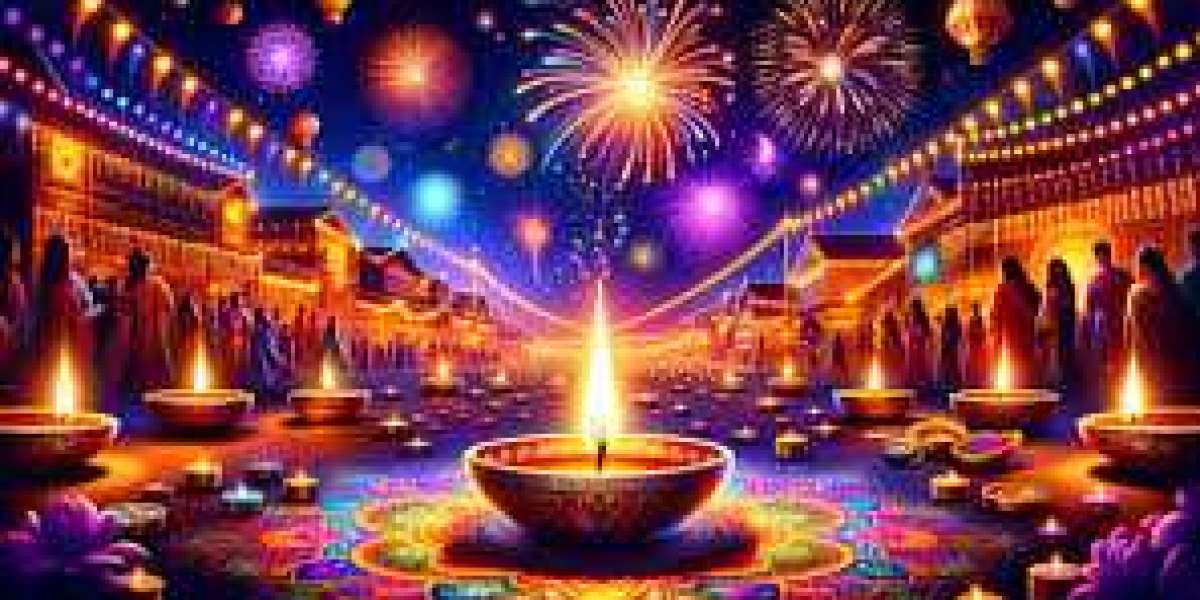Diwali, also known as Deepawali or Deepavali, is one of the most significant Hindu festivals celebrated in India and among Indian communities worldwide. Known as the "Festival of Lights," Diwali 2024 symbolizes the victory of light over darkness and good over evil. This vibrant celebration brings families, friends, and communities together to partake in joy, love, and spirituality.
Significance and Meaning of Diwali 2024
The name "Diwali" is derived from the Sanskrit word "Deepavali," meaning "row of lights." The festival's central theme revolves around the triumph of light over darkness. In Hindu mythology, Diwali is associated with several stories, the most famous being the return of Lord Rama to his kingdom Ayodhya after 14 years of exile and his victory over the demon king Ravana. To celebrate his homecoming, the people of Ayodhya lit oil lamps (diyas) throughout the city, signifying the removal of spiritual darkness.
Diwali is not only a religious festival but also a cultural celebration that signifies new beginnings, the renewal of life, and the victory of good virtues over negative forces. It is celebrated with great enthusiasm and is considered an auspicious time for starting new ventures, purchasing new items, and sharing happiness.
Diwali 2024: Date and Duration
In 2024, Diwali will be celebrated on October 31st, a Thursday. The date of Diwali varies each year according to the Hindu lunisolar calendar, which is based on the position of the moon and the sun. Diwali typically falls in the Hindu months of Ashvin and Kartika, which correspond to mid-September to mid-November in the Gregorian calendar.
Diwali is a multi-day festival that usually lasts for five days. Each day of Diwali has its own significance and rituals:
Dhanteras: The festival begins with Dhanteras, a day dedicated to wealth and prosperity. On this day, people clean and decorate their homes and purchase new items such as gold, silver, or kitchenware, believing it will bring good luck and prosperity.
Choti Diwali (Naraka Chaturdashi): The second day is known as Choti Diwali or Naraka Chaturdashi. This day commemorates the victory of Lord Krishna over the demon Narakasura. People celebrate by lighting lamps, bursting firecrackers, and preparing special sweets.
Diwali (Lakshmi Puja): The third day is the main day of Diwali and is marked by Lakshmi Puja, where devotees worship Goddess Lakshmi, the goddess of wealth and prosperity. Homes are illuminated with oil lamps and colorful rangoli designs, and families exchange gifts and sweets.
Govardhan Puja (Padwa): The fourth day, Govardhan Puja, also known as Annakut or Padwa, celebrates Lord Krishna's victory over Indra, the god of rain and thunder. This day is marked with prayers, feasts, and the preparation of large quantities of food.
Bhai Dooj: The final day of Diwali is Bhai Dooj, a day that celebrates the bond between brothers and sisters. Sisters perform aarti (a ritual involving the waving of a lamp), apply tilak (a ceremonial mark) on their brothers' foreheads, and pray for their well-being, while brothers give gifts to their sisters.
Celebrations Across India
Diwali is celebrated with great fervor and diversity across India. In northern India, cities and villages are lit up with diyas and decorative lights. The streets are filled with the sounds of firecrackers and the aroma of delicious sweets. In western India, especially in Gujarat and Maharashtra, Diwali marks the start of a new financial year, and special rituals are performed for prosperity in business.
In eastern India, particularly in West Bengal, Diwali coincides with Kali Puja, where devotees worship Goddess Kali, the fierce form of Goddess Durga. The celebration also extends to southern India, where it is known as Deepavali. The traditions vary slightly, but the essence of celebrating light, joy, and togetherness remains the same.
Festivities and Traditions
Diwali is not just about lights and sweets; it is a celebration that encompasses several cultural, social, and spiritual aspects. Some of the most common traditions during Diwali include:
Lighting of Diyas and Rangoli: Homes are adorned with earthen oil lamps (diyas) and colorful rangoli patterns at the entrance, symbolizing the welcoming of positivity and warding off negativity.
Bursting of Firecrackers: Fireworks and firecrackers are an integral part of Diwali celebrations. They are believed to ward off evil spirits and signify joy and happiness.
Exchanging Sweets and Gifts: Exchanging sweets, dry fruits, and gifts among family, friends, and neighbors is a popular tradition, symbolizing the sharing of joy and love.
Wearing New Clothes: On Diwali, people dress in new, colorful clothes, adding to the festive atmosphere and symbolizing renewal and purity.
Special Feasts: Diwali is also a time for indulging in sumptuous meals, special dishes, and sweets such as laddus, barfis, jalebis, and more. Families come together to prepare and enjoy these delicacies.
Conclusion
Diwali is a festival that brings people together, transcending cultural and geographical boundaries. It is a time to celebrate life, cherish relationships, and spread light in the world. Whether it is through the glow of a lamp, the crackle of a firecracker, or the warmth of a shared meal, Diwali reminds us of the eternal truth that light will always prevail over darkness and that good will always triumph over evil.
Read Also
1) Hindu Temple













